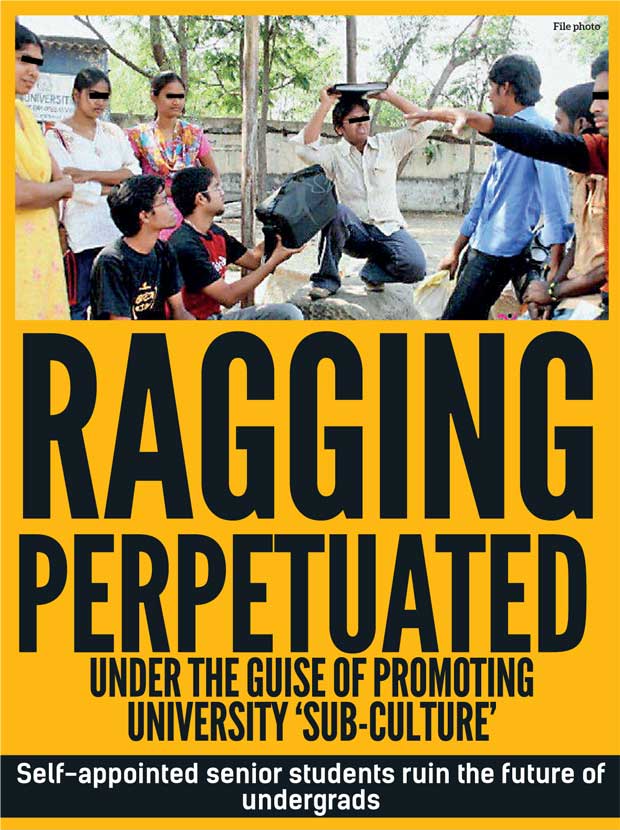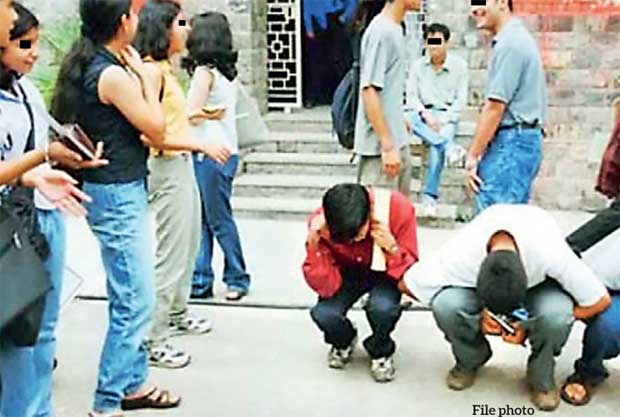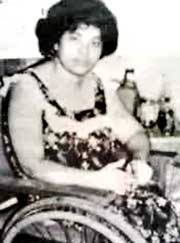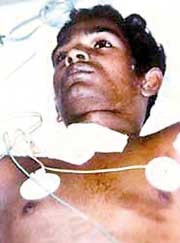Reply To:
Name - Reply Comment

Since childhood, our parents and teachers have inculcated in us that respect should be earned and not demanded. However, in our campuses, seniors demand respect and reprimand freshers for not showing it. Freshers are compelled to greet the seniors in the morning. In fact they are interrogated as to how many seniors they greeted during table talks, mostly in the canteen. Freshers are required to come early and stay late so they can ‘participate’ in the involuntary ‘discussions’. They are forced to learn and memorize the university jargon and kavi poems. This is supposed to be part of the university student subculture. However, this is ragging in operation at its mildest form.
to come early and stay late so they can ‘participate’ in the involuntary ‘discussions’. They are forced to learn and memorize the university jargon and kavi poems. This is supposed to be part of the university student subculture. However, this is ragging in operation at its mildest form.
Freshers are verbally abused in filth. Their self-esteem is crushed. They are belittled and demeaned. They are humiliated before others. This is undeniably the experience of the majority. also learns that male students are more susceptible to physical ragging while female students are sexually harassed as well. We have also had a gruesome history of suicides triggered by ragging. Yet when ragging is exposed and the relevant student body is questioned, they argue that only a few bad apples resort to ‘ragging’ and that the reported incident is not even related to ragging. They even go on to say that the victim had concocted the story to sling mud at them.
Student Unions declare that they are against ragging, though this stance is questionable in the light of the reports Daily Mirror has received. Freshers, under the conditions of anonymity fearing repercussions, told us they were ragged wherever the seniors caught them; be it in the toilet or the canteen. One student expressed fear and added that the raggers were ‘criminals’ and that she had never met people as ‘evil as them’. You are harassed for refusing or missing the rag as well. The dress code is very restrictive, inconvenient and unjustifiable. Students said it seemed as if the raggers ‘got a kick out of ragging the freshers.’ Seniors are able to convincingly win the loyalty of certain freshers who become informants and betray their fellow peers. Freshers are also in a dilemma as refusing the rag leads to being an ‘outcast’ and they would not be permitted to join clubs and societies subsequently, as seniors would harass them.
Seniors make freshers dependent on them early on by disparaging the lecturers, emphasising the difficulty of assignments and the need for the seniors’ notes. Freshers are thus compelled to cooperate with seniors. When juniors are overpowered, being submissive may seem the better option as standing against seniors can attract attention in the form of further physical and verbal attacks as we have seen in the Peradeniya University. This is where university authorities, including lecturers, play a pivotal role in encouraging students to stand against ragging and providing moral support, instead of turning a blind eye to its occurrence.
Following are the testimonies of parents who have been driven to desperation as a result of the mental trauma their children have undergone at the hands of the raggers.

Lionel Wickramasinghe, a lawyer from Gampaha, told of how his son who was ragged and assaulted was now seeking treatment at the Ragama Hospital. “Before the inauguration, seniors conducted unofficial meetings in each district. They contacted students over the phone and through social media,” said Wickramasinghe. At the meeting in Gampaha which his son attended, he had been severely scolded and had refused to go to university, though he had subsequently agreed to it.
His son was to stay at the hostel of the Ruhuna University. On the first day itself, only a group of ten students were allowed to go to the canteen to get dinner. However the students who were permitted to go, including Wickramasinghe’s son, were scolded derogatorily. On the other hand, the students who were not allowed to go were rebuked for being flimsy and listening to others’ orders.
“He had been walking alone on an incomplete concrete road between the hostel and the canteen when seniors stopped him, scolded him and asked him to undress, which he had refused to do,” he said.
That same day seniors had halted the water connection to the hostel bathrooms. “Freshers had been woken up at 1 a.m. and ragged. The staff warden, who was in a room close by had not even come to look into it,” he added.
Thereafter, the son visited his parents in Gampaha and returned to the university after a week. On the day he returned, on his way to the canteen, seniors approached him and took him to the seniors’ hostel. The seniors slapped the fresher on both cheeks, beat him on his back and asked him to undress, to which he refused. “He was pulled by the collar. There are nail marks on his neck. The buttons of his shirt have been ripped off. He has been beaten severely,” his father said.
Unable to bear the assault, the son fainted and regained consciousness after about fifteen minutes. The seniors scolded him saying he was pretending. He fainted once again and was kicked. “Hearing footsteps, they pushed my son out of the dormitory. He had walked out of the university with difficulty, passing a security guard as well. He took a bus home,” said the father. Wickramasinghe said his son pleaded with him not to complain to the police, as his peers could be ragged even more as a result of it.
“We met the UGC chairman seeking a transfer. When my son was narrating his experience, he fainted due to his traumatic experience. The Vice Chancellor was also contacted. He asked us to come to the university, saying he would take care of it,” he said. However, they had not been successful in procuring a transfer.
“The boys had been asked to act as if they were in pornography.”
The parents of a fresher, a hosteller at the Rajarata Management Faculty, have also been very apprehensive over the frequent complaints of their daughter about ragging. She had on several occasions refused to go back to the university. According to her mother, seniors surround freshers, intimidate them and scold them in obscene language. “Freshers have been asked to come to the canteen called ‘hilton’ at 6 a.m., where they are ragged. Freshers are required to remember the names of all their peers (300 students or more), their parents’ names and room number. If they didn’t know these, they would be scolded and degraded inhumanly,” the mother said.
Lectures end by 5 p.m. However, all freshers are required to go to the canteen afterwards. Female freshers are released from the rag just before 8.30, which is the latest time to enter the hostel. Male freshers are allowed to leave before 10.30, so they could enter the hostel.
However, the mother said the seniors came to the boys’ dormitory at 12 a.m. and ragged them till 3 a.m. “They had been asked to act as if they were in blue films (pornographic content). One person had to play music while another pretends to be videoing it,’ she said. On the day of the inauguration, the parents had been told by members of the student council at a meeting that there was no ragging in the university. However they had learned that this was far from the truth.
Prof. Mohan De Silva, the chairman of the University Grants Commission (UGC) said that the university had not given any power to the seniors. “Student Councils say they teach freshers the  good and the bad. But this is not what they do. Universities have not given student unions the power to do whatever they want to in this manner. Ragging in our language is termed as a subculture by students. The problem is to draw the line here,’ he said.
good and the bad. But this is not what they do. Universities have not given student unions the power to do whatever they want to in this manner. Ragging in our language is termed as a subculture by students. The problem is to draw the line here,’ he said.
“In the South East university, the police is involved. There have been many complaints. For the first time, students gave complaints in writing. Students have become stronger in reporting,” he said, adding that the universities have also become proactive in putting a stop to ragging.
“This year, there was an affidavit in the handbook on the registration process which is expected from the mother, father or guardian, that they have understood the consequences of their child getting caught for ragging. The Ragging Act of 1998 is now implemented by the judiciary and ragging is an non-bailable offense,’ he noted.
When asked about transferring students who have been ragged severely and who are unable to return to the university, Prof. De Silva said that it was not possible. “Transfers are not possible as students are given a university based on their z-score and whether they have asked for it. There is a complicated equation. It is done through a software and if you change one, the whole thing will change. There are so many cases where students have got ragged and hammered. At the same time, there are people who use ragging to procure a transfer,” he said.
Referring to the options available for students to complain, Prof. De Silva said the main problem was that students did not complain. “There are student counsellors. Their telephone numbers are given to the students. But students are scared to complain as the environment is such. They can ring the UGC. There is a separate number for this purpose. When it’s reported, we inform the university and they initiate action. Without someone coming forward we can’t punish anyone. This is our problem. But this situation is changing,” he said. He added that students could complain to the police as well.
“We don’t permit students to harass, threaten, abuse or physically attack others.”
As Lahiru Weerasekara, the convener of the Inter-University Students Federation (IUSF) has been remanded for breaching bail conditions, Daily Mirror spoke to Mangala Maddumage, the Acting convener of the ISUF. When we asked him about the ‘discussions’ by the seniors that took place mainly during the interval but also prior to and after lectures in certain universities, he said it was essential to hold such discussions. “When first years come to the university, the seniors go and speak to the students for one hour from 12 p.m. to 1 p.m. Problems that arise during their university education are addressed. First years need this help. This is what happens in universities around the country,’ he said.
He added that the talks were not part of the activities of the Students’ Unions. He said, however, that the student unions were informed beforehand.
He also said there was a programme in place to prevent ragging and that they did not accept ragging. “With our involvement, we have been able to reduce ragging to a certain extent,” he said.
“We don’t permit students to harass, threaten, abuse or physically attack others. We condemn such actions. We have advised students not to verbally or physically harass freshers, as that is not the way to make people tread the right path,” he said.
“There are two factions, those who take part and those who don’t take part in social activities in the university. This cannot be denied,” he noted. When questioned as to whether people who did not take part were harassed, he replied in the negative, adding that he had in fact helped such students in their academic studies and that they were not penalized in anyway. “There might be one or two who concoct stories of being ostracized. But this cannot be considered to be the experience of the majority,” he said.
After imposing the bail conditions, the additional magistrate was alleged to have remarked that though the suspects believed ragging to be good, it was prohibited by law and therefore if the suspects wanted to change the law, they would have to go to the parliament to do so.
When the case involving the assault of the second year student, Sasinindu Patabendige came up before the Kandy Additional Magistrate last week, the seven identified suspects were bailed out while the eighth suspect was discharged, as he had not been identified by the victim during the Identification Parade. The victim had been assaulted in the Peradeniya university premises on January 18, for speaking out against the ragging of freshers.
The prosecution wanted the suspects to handover an affidavit stating that they would not interfere with the witnesses or take part in ragging. However, when the affidavit was submitted by the Defense counsel, the additional magistrate did not accept it, saying the oral submission was adequate.
In 1975, a 22-year-old female student, Rupa Rathnaseeli of the Faculty of Agriculture, became  paralyzed as a result of jumping from the second floor of the hostel to escape physical ragging. It was reported that she was about to have a candle inserted into her vagina just before she had jumped out of the hostel. She committed suicide in 2002.
paralyzed as a result of jumping from the second floor of the hostel to escape physical ragging. It was reported that she was about to have a candle inserted into her vagina just before she had jumped out of the hostel. She committed suicide in 2002.
In 1997, 21-year-old S. Varapragash, an Engineering student of the University of Peradeniya, died of  kidney failure following severe ragging by senior students.
kidney failure following severe ragging by senior students.
In 2011, a female student attached to the Faculty of Humanities and Social Sciences, University of Ruhuna, became semi-paralysed in one limb as a result of the ragging she underwent at the faculty canteen.
In 1997, Kelum Thushara Wijetunge, a first-year student at the Hardy Technical institute in Ampara, died of kidney failure after he was forced to do tough exercises and drink excessive quantities of liquor.
died of kidney failure after he was forced to do tough exercises and drink excessive quantities of liquor.